#discworld: small gods
Text
Fear is strange soil. Mainly it grows obedience like corn, which grows in rows and makes weeding easy... but sometimes it grows the potatoes of defiance, which flourish underground.
The citadel had a lot of underground. There were the pits and tunnels of the quisition. There were cellars and sewers, forgotten rooms, dead ends, spaces behind ancient walls, even natural caves in the bedrock itself.
-Terry Pratchett, Small Gods
...........
This book has the most raw and striking metaphor and smoothest transition to the layout of the city istg. Amazing.
#small gods#discworld#terry pratchet#gnu terry pratchet#discworld: small gods#heli and discworld#gives me goosebumps#this is nuts#i like small gods a lot
117 notes
·
View notes
Text
One of the recurring philosophical questions is:
"Does a falling tree in the forest make a sound when there is no one to hear?"
Which says something about the nature of philosophers, because there is always someone in a forest. It may only be a badger, wondering what that cracking noise was, or a squirrel a bit puzzled by all the scenery going upwards, but someone. At the very least, if it was deep enough in the forest, millions of small gods would have heard it.
Things just happen, one after another. They don't care who knows. But history...ah, history is different. History has to be observed. Otherwise it's not history. It's just...well, things happening one after another.
Terry Pratchett, Small Gods
#history monks#small gods#discworld#terry pratchett#history#causality#events#meaning#philosophy#philosophers#observation#reality#perception#knowledge#squirrels#badgers#the nature of philosophers#things just happen#if a tree falls in a forest
1K notes
·
View notes
Text
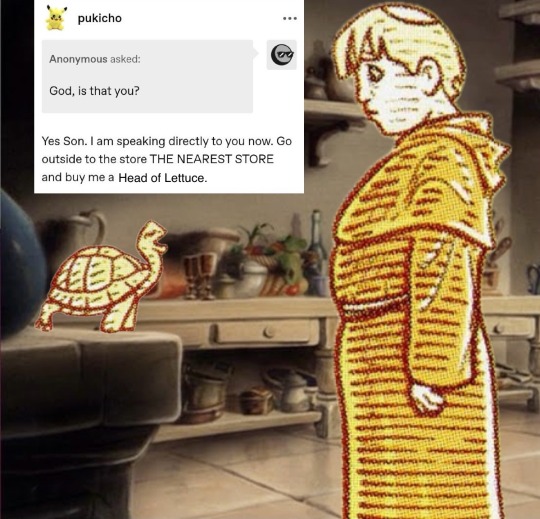
#discworld#gnu terry pratchett#meme#discworld meme#created by yours truly#small gods#brutha#om#the gods#omnia#omnianism#food/drink
2K notes
·
View notes
Text
just finished small gods by terry pratchett and now i'm a having an existential crisis about what religion even is and also the fact that terry pratchett was a real person that wrote books and i just get to read them for free from the library
236 notes
·
View notes
Text
What gets to me about Vorbis is that he's sincere. He's not corrupt, he's not a hypocrite; he is a pious follower of the Church of Om who obeys every rule. And yet he is one of the evilest people on the Disc.
I'm only casually familiar, but I get the feeling that there's a common plot where there's a corrupt and decadent religion that is returned to its good roots by a humble believer. The villains are often priests who put up a veneer of piety in public while they secretly hoard wealth and get drunk in violation of their religion's tenets.
Small Gods is not that plot. Brutha isn't fighting the corruption of Om's words, nor is he fighting people who use religion as a means to wealth and power. If anything, he's the one who 'corrupted' Omnianism into a religion of peace and debate.
The church under Vorbis isn't a corruption of Om's words as much as a distillation; at the very start, Om only cared about getting new followers and putting unbelievers to the sword, and now he has countries conquered in his name and heretics put to the knife. And Vorbis doesn't seek wealth or power for himself; he denies himself pleasures of the flesh, and dedicates himself entirely to his religion (or so he thinks).
When Vorbis kills the porpoise, not even Brutha can find a word in the books of the Prophets against that. When Didactylos burns the Library of Ephebe, he says it's in part a way to keep its knowledge out of Vorbis's hands, but Brutha knows that Vorbis would not read a single scroll. And the scene where Om and Brutha are eating the melon in Ephebe hits me every time; Om thinks that Vorbis is feasting, while Brutha says that he only eats stale bread. He adds that he sits and waits for the bread to get stale.
152 notes
·
View notes
Text
‘You got to remember there’s three basic approaches to philosophy in these parts,’ said Didactylos. ‘Tell him, Urn.’
‘There’s the Xenoists,’ said Urn promptly. ‘They say the world is basically complex and random. And there’s the Ibidians. They say the world is basically simple and follows certain fundamental rules.’
‘And there’s me,’ said Didactylos, pulling a scroll out of its rack.
‘Master says basically it’s a funny old world,’ said Urn.
‘And doesn’t contain enough to drink,’ said Didactylos.
-- Terry Pratchett- Small Gods
257 notes
·
View notes
Text
I just think it’s fun that the Librarian is one of the longest-running characters in the Discworld series, right alongside Rincewind. He was in The Colour of Magic! He appears in so many books, too, in a few of the different book-arcs and even the standalones!
But at the same time, I also think it’s hilarious that the Librarian was turned into an orangutan within the timespan the series covers. It happened during The Light Fantastic. And yet by the time of Sourcery and Guards! Guards!, just a few books later, people are just like ‘oh that’s the Librarian.’ It’s not just wizards who accept this as mundane reality, even! The Librarian goes out on the town regularly enough that many regular Ankh-Morpork citizens have already learned the golden rule which is Don’t Call the Librarian a Monkey, not too long after his transformation!
This is so realistic to human nature tbh, and yet still wild to think about.
#kidk says stuff#discworld#terry pratchett#gnu terry pratchett#like the librarian even has a cameo in SMALL GODS that may well be baffling to anyone for whom that is their first discworld book
2K notes
·
View notes
Text
gah now i'm getting On My Shit about the discworld again and like i've said what i want to say about the witches and the watch but there's also small gods like i will never be over small gods i finished it and i was like... has this... has this healed some of my religious trauma?
if you've never read it, the plot is thus: on the disc, gods get their power from belief. therefore, the more believers a god has, the more powerful they are. and so, there is this god -- om -- who has risen in power, who has a country devoted to His worship, which hunts down and slaughters heretics and infidels, to whom people pray multiple times a day and make pilgrimages to His holy city, which has a huge citadel and huge structure of a complex religion devoted to his worship. and, on a whim, He comes down one day to see how things are going.
and discovers that he has no power.
that, in this country of millions who profess to worship Him with all their hearts, there is only one person left who actually believes in Him.
and there's a lot of meat there, and a lot more plot to delve into, but the core theme ends up boiling down to this:
can you forgive your god for how they failed you?
and do they deserve that forgiveness? how can they earn that forgiveness?
because ultimately, the forgiveness that the messianic archetype is embodying is not that of the god's grace, but of the people's -- to forgive their god his absence. to give their god another chance to be their god.
and whether or not you, in the end, can forgive, it gives you the language to realize that this is what you were asking for with your last prayers. whether or not you can ever go back, whether or not there have been other reasons since that have convinced you further, it gives you the language to accept that your god failed you. and it is not your fault.
this book speaks loudest, perhaps, to those of us who left our church with grief, not with anger. with hurt betrayal, not with the fires of defiance.
it didn't change my lack of religious belief, but it helped me conceptualize my feelings about the church, the things that went deeper than intellectual arguments. about that sense of betrayal, that hurt, that twisted-up knot within me that it had built, and it gave me the mirror within which i could see that i had been failed by my beliefs. it wasn't that i hadn't believed enough, it was that my belief had been betrayed by the absence of an answer.
there have been other reasons since then that have cemented my atheism, but small gods made me stop hating the church i used to love, because it made me recognize why i hated it so much and said "you're not wrong, it didn't have to be this way. you were betrayed and you were failed and you can let it go, now."
#discworld#gnu terry pratchett#small gods#religious trauma#i won't pretend it fixed everything because it's not that simple#but it gave me the language to understand the core of my emotions coming out of that awful place#and that was a seismic shift#i was steadily veering towards the Angry Atheist archetype but it unraveled that anger within me#i'm no less an atheist and this book never tried to change that - sir terry was a secular humanist and this is very much not one of those#preachy christian books like it is *aggressively* not one of those preachy christian books#it's about religious trauma and working through it and dealing with your complicated feelings about your religion#and having that mirror to recognize that what i was feeling *was* trauma. it *was* betrayal. and i wasn't wrong to feel it.#shifted something deep within me
281 notes
·
View notes
Text
The people who really run organisations are usually found several levels down, where it’s still possible to get things done.
Terry Pratchett, Small Gods
169 notes
·
View notes
Text
Colour of magic cameo in good omens!!!1!

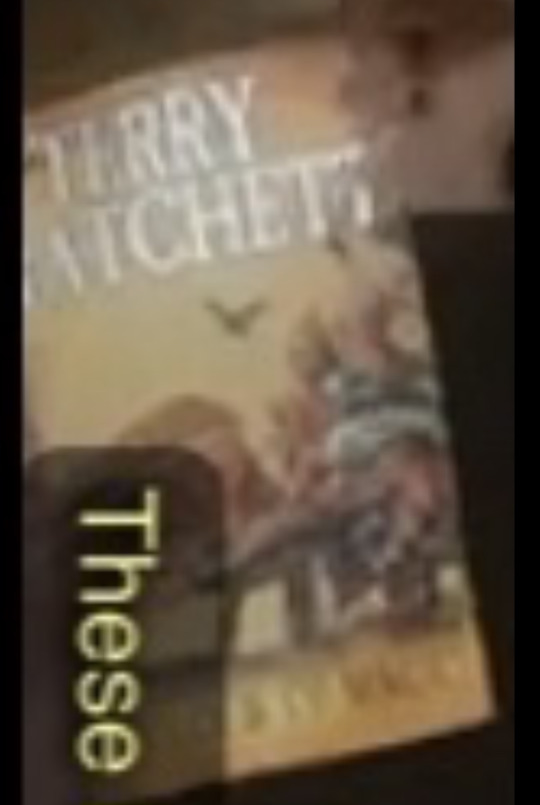
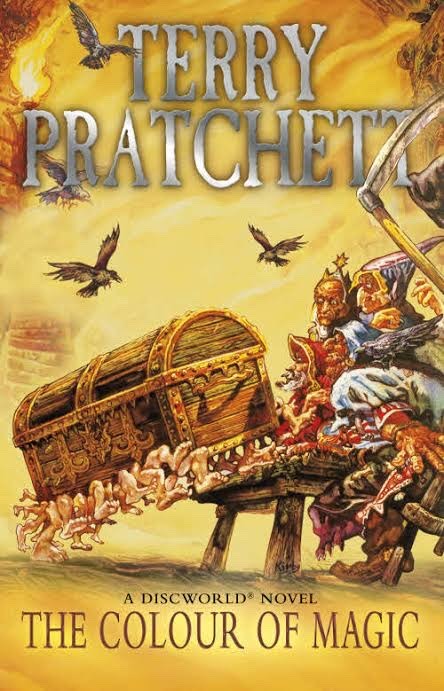
:DDDDD
#I saw that and went holy shit!!1#that’s the thing!!!1#my quality is so awful to I’m surprised I caught it#I lowkey wish was small gods#that would have been hilarious to me specifically#discworld#gnu terry pratchett#dw#good omens#:DDD#the special interest is fed#good omens 2#the bastards bullshit
285 notes
·
View notes
Text
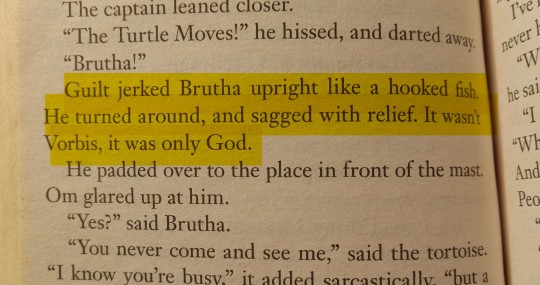
Do people still say 'mood'? Even if they don't: mood.
#ive been there. youve been there. evidently our friend terry knows this is a cornerstone of the human experience#gnu terry pratchett#terry pratchett#discworld#small gods
75 notes
·
View notes
Text
"No. Men should die for lies, but the truth is too precious to die for."
Terry Pratchet, Small Gods
.............
this one is very interesting. I need to sit on this first.
#discworld#small gods#terry pratchet#gnu terry pratchett#discworld: small gods#brutha#heli and discworld
48 notes
·
View notes
Text
What Brutha had thought was a rock in the sand was a hunched figure, sitting clutching its knees. It looked paralyzed with fear.
He stared.
"Vorbis?" he said.
He looked at Death.
"But Vorbis died a hundred years ago!"
YES. HE HAD TO WALK IT ALL ALONE. ALL ALONE WITH HIMSELF. IF HE DARED.
[...] The black-on-black eyes stared imploringly at Brutha, who reached out automatically, without thinking...and then he hesitated.
HE WAS A MURDERER, said Death. AND A CREATOR OF MURDERERS. A TORTURER. WITHOUT PASSION. CRUEL. CALLOUS. COMPASSIONLESS.
"Yes. I know. He's Vorbis," said Brutha. Vorbis changed people. Sometimes he changed them into dead people. But he always changed them. That was his triumph.
He sighed.
"But I'm me," he said.
Vorbis stood up, uncertainly, and followed Brutha across the desert.
Death watched them walk away.
Terry Pratchett, Small Gods
#brutha#vorbis#DEATH#small gods#discworld#terry pratchett#afterlife#character#character development#judgment day#mercy#compassion#all alone#fate#choices#change#people change#self awareness#but i'm me#morality#ethics#last words#long quote
197 notes
·
View notes
Text
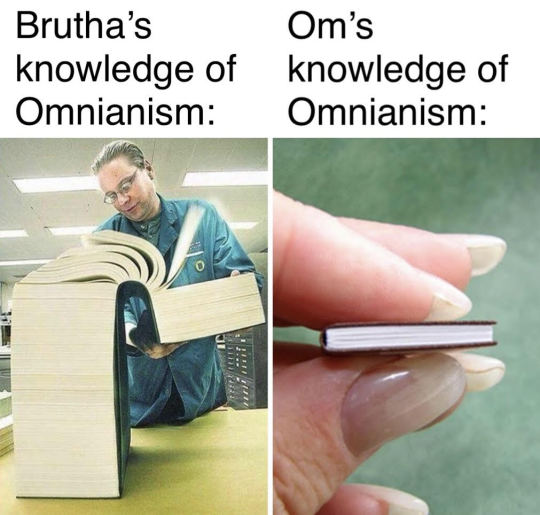
#discworld#gnu terry pratchett#meme#discworld meme#created by yours truly#small gods#brutha#om#omnianism
564 notes
·
View notes
Text
one of my goals for 2024 is to read more of discworld
so if you’re a discworld fan plz drop your favorites in the notes i’d love recommendations on where to start
#i’ve read small gods already (planning to reread soon cuz i don’t remember it very well)#and i own guards! guards! but haven’t read it yet#but i’m not sure which other series are good to go to after that#anyways discworld fans hook me up with the best of the best#discworld books#discworld#terry pratchett#sir terry pratchett#sir terry
106 notes
·
View notes
Text
“That was the trouble with slow people. Give him a fool any day. Slow people took some time to catch up, but when they did they rolled right over you” - Terry Pratchett, small gods
In small gods this quote always stood out to me and I think I just realized this idea is so core to the book and the general arc of the book. Like this is one of Brutha’s core traits and also kind of the primary arc of the book. I think unlike most protagonists with an arc of the sort Brutha has, as well as in comparison to the other people fighting Vorbis, he takes a long time to really seemingly leave the harmful beliefs behind. However when he does he bowls everyone else over.
This quote, as well as Brutha’s characterization in general, also made me think about what exactly slowness is. I think, at least in this case and context, slowness is taking the time in your thought. Brutha really takes the time to come to conclusions he comes to. He thinks about what he is learning, and some of it is probably partially denial, but in comparison to other characters that deal with this kind of situation there is not a lot. Instead it is more like he comes to his conclusions slowly and with consideration.
#terry pratchett#gnu terry pratchett#discworld#small gods#brutha#idk I just really liked this take on ‘slowness’#I think in some ways I can be like that too#I’ll learn a new piece of information in a discussion with someone#and then I may need a day or so or more to really sit with my opinions on the topic#idk brutha is just a really cool character to me#and man how does pterry write characters with such intricate personal selves#they’re all so complicated in just their way of thinking#and individual#it’s so cool
280 notes
·
View notes